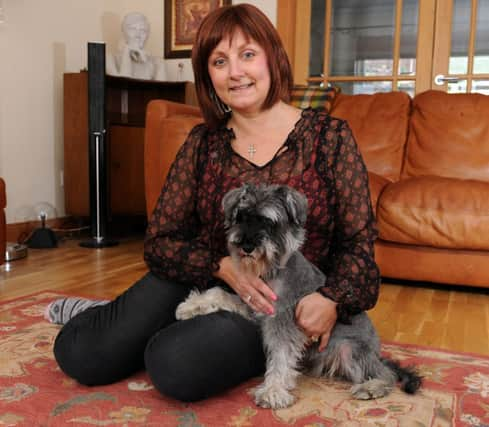Life or death plea over breast cancer drug


The Scottish Medicines Consortium (SMC) has heard evidence from clinical trials that showed Kadcyla has marked benefits for women with incurable breast cancer and will tomorrow rule on whether to approve the drug for use on the NHS in Scotland.
Studies have shown the drug extends life expectancy of women in the late stages of a type of breast cancer, known as HER-2 positive, by an average of six months compared with other treatments.
Advertisement
Hide AdAdvertisement
Hide AdSome doctors and patients have reported life expectancy extending much longer, in some cases up to two years. It was also found to improve quality of life with fewer side effects than other treatments.
But concerns have been raised over its high cost, around £110,000 per patient a year.
If approved Kadcyla would cost the NHS in Scotland £1.82 million in its first year, rising to £4.98m after five years. Use of the drug has already been rejected by NHS watchdogs in England.
Now doctors, health campaigners and patients are calling for a compromise to be reached so the drug, a targeted therapy that attacks cancer with a direct dose of chemotherapy while leaving healthy cells untouched, can become a new tool in the fight against the killer disease.
More than 4,500 women are diagnosed with breast cancer in Scotland each year, with around 1,000 dying from the disease annually. It is the most commonly diagnosed cancer in women in Scotland.
Samantha Davison, a 47-year-old mother of two from Dunfermline, said getting the drug was the lifeline for which she had hoped.
She was diagnosed with a primary cancer in 2005 and underwent a lumpectomy. She then endured five months of gruelling chemotherapy followed by intensive radiation treatment.
She was clear of the disease for four years before a new lump was discovered. Tests showed her condition had progressed and was incurable.
Advertisement
Hide AdAdvertisement
Hide AdDavison has been taking Herceptin, a highly rated drug that was finally approved for NHS use after a similar controversy over cost versus prognosis, and is so far responding well.
However, doctors have warned her the disease may become resistant any day, rendering the treatment useless. Kadcyla was that option.
Commenting on fear the SMC would reject use of the drug, she said: “It denies me hope.
“I have a life to live. I have a life worth living. I have a family. I want to stay around as long as possible, and to prolong my life might give me a better chance of maybe benefitting later down the line if a potential cure comes out.
“Herceptin has kept me going for the past five years. If Kadcyla could do the same, who knows, in a little more time, something else brilliant could come out that could just keep me going again. It’s just having that hope.”
James Jopling, director for Scotland at the charity Breakthrough Breast Cancer, said: “Kadcyla is a very effective treatment option for women with a particular type of secondary breast cancer who have stopped responding to previous treatments.
“It has the potential to provide them not only with six months or more additional time, but importantly, quality time to spend with their friends and families.
“At this stage we have done all we can to argue the case for Kadcyla to be approved and can only hope that both the SMC and the drug company have done the same in order to push this impressive drug through the system for those that desperately need it.
Advertisement
Hide AdAdvertisement
Hide Ad“We want to see every cancer patient have access to the best available treatments. We urgently need to change the way the system works so that breast cancer patients right across the UK get the drugs they need at prices the NHS is able to pay.”
Rejection by the SMC will leave patients with unanswered questions, according to David Cameron, professor of oncology at the University of Edinburgh and director of cancer services for NHS Lothian.
He said: “The drug lets patients get on with their lives and that is what they and we want. We are all on tenterhooks because we would like to be able to give the patients the drug but we know the healthcare economy is struggling. The difficulty patients will face if the answer is no is that they will not know why.”
In 2006 the UK Court of Appeal decided that a breast cancer patient should receive the drug Herceptin after a long-running legal fight.
The decision had widespread implications for other cancer patients who were able to receive the drug said to halve the chances of the aggressive HER-2 form of breast cancer returning.
It targets the HER-2 protein, which can fuel the growth of breast tumours. Herceptin prevents this happening. Around a fifth of breast cancers are HER-2 positive.